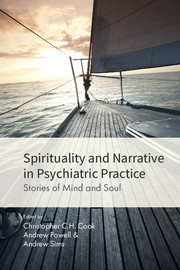Book contents
- Frontmatter
- Contents
- List of contributors
- Foreword
- Preface
- 1 Narrative in psychiatry, theology and spirituality
- 2 Spirituality and transcultural narratives
- 3 Psychopathology and the clinical story
- 4 Helping patients tell their story: narratives of body, mind and soul
- 5 Gods lost and found: spiritual coping in clinical practice
- 6 Stories of joy and sorrow: spirituality and affective disorder
- 7 Stories of fear: spirituality and anxiety disorders
- 8 Stories of transgression: narrative therapy with offenders
- 9 Narratives of transformation in psychosis
- 10 My story: a spiritual narrative
- 11 God's story revealed in the human story
- 12 Meaning without ‘believing’: attachment theory, mentalisation and the spiritual dimension of analytical psychotherapy
- 13 Stories of living with loss: spirituality and ageing
- 14 Beginnings and endings
- Index
Preface
Published online by Cambridge University Press: 02 January 2018
- Frontmatter
- Contents
- List of contributors
- Foreword
- Preface
- 1 Narrative in psychiatry, theology and spirituality
- 2 Spirituality and transcultural narratives
- 3 Psychopathology and the clinical story
- 4 Helping patients tell their story: narratives of body, mind and soul
- 5 Gods lost and found: spiritual coping in clinical practice
- 6 Stories of joy and sorrow: spirituality and affective disorder
- 7 Stories of fear: spirituality and anxiety disorders
- 8 Stories of transgression: narrative therapy with offenders
- 9 Narratives of transformation in psychosis
- 10 My story: a spiritual narrative
- 11 God's story revealed in the human story
- 12 Meaning without ‘believing’: attachment theory, mentalisation and the spiritual dimension of analytical psychotherapy
- 13 Stories of living with loss: spirituality and ageing
- 14 Beginnings and endings
- Index
Summary
Spirituality and Psychiatry was published by RCPsych Publications in 2009. As editors of that volume, we have been gratified to note its warm reception and that the book was felt to have made a constructive contribution to the debate about the place of spirituality in contemporary clinical practice. So why, 6 years on, might it be timely for a further volume on the topic?
First, we are aware that there were gaps and omissions in Spirituality and Psychiatry. For example, it did not have much to say about affective disorders or about forensic psychiatry, and it did not have an author who wrote as an identified user of mental health services.
Second, while Spirituality and Psychiatry sought to be relevant to clinical practice and included a series of case histories, we realised in the course of our work as editors that it presented more questions than answers in relation to good practice in this newly developing field. Issues raised by spirituality in mental healthcare continue to be the subject of controversy, and we therefore felt that a second volume, with a different approach, could helpfully further the debate.
Third, while the evidence base has continued to grow steadily over the past 6 years, an important theme to emerge concerns the management of professional and ethical boundaries relating to spirituality and faith in clinical practice. There is therefore a need for a book that is cognisant of recent research literature, but which is also anchored in the realities of clinical practice. The present volume does not seek to review the recent quantitative research literature, although most contributors have made at least some reference to it. It does seek to address the realities of clinical practice in the context of the ongoing professional debate.
Fourth, for service users, spirituality and faith are closely connected with questions of relationship, transcendence and finding meaning and purpose in life – all of these questions being often best explored by way of narrative (or story). Narrative has provided an important theme in recent years in both medicine (Greenhalgh & Hurwitz, 1998; Roberts & Holmes, 1999; Engel et al, 2008) and theology (Loughlin, 1999).
- Type
- Chapter
- Information
- Spirituality and Narrative in Psychiatric Practice , pp. xi - xivPublisher: Royal College of PsychiatristsPrint publication year: 2016



